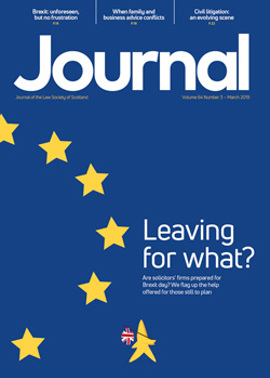Parentage or privacy?

In the recent case of Mifsud v Malta (application no 62257/15, 29 January 2019), the European Court of Human Rights (ECtHR) considered the intersection between the right to private life in terms of article 8 of the Convention and the right of a child to know the identity of their biological father.
The dispute
The Maltese Civil Code makes provision for the Civil Court to substitute consent and to order acquiescence in the taking of a sample for genetic testing where there is a dispute regarding parentage. The applicant in Mifsud was the subject of an application by X to declare him her biological father and to amend her birth certificate accordingly. At the time of the application, Mifsud was 74 and his putative daughter X, 55.
Mifsud’s position was that he had not been involved in X’s conception and that her mother had had various partners at the time of conception. X’s position was that she was a child of a relationship between her mother and Mifsud and that she had always been told that he was her father. She had noted a personal resemblance between herself and one of Mifsud’s acknowledged daughters, and there was a background whereby, according to X, Mifsud had effectively accepted that she was his daughter, albeit he had told her that he would not inform his children about her. Mifsud became godparent on the birth of X’s daughter.
He suggested that X move to the UK to live with him and provided her with a property to reside in. Their relationship remained a close one until around 1985, but deteriorated after X was evicted from the property. X’s mother also gave evidence that Mifsud was X’s father. The only evidence in the case was X’s affidavit and that of her mother. The mother was cross-examined by Mifsud.
In accordance with the provisions of the Maltese Civil Code, X requested that the court order Mifsud to undertake genetic testing.
Mifsud objected to mandatory testing on the basis that granting an order would breach his human rights, in particular his rights under article 8 of the Convention (the right to respect for private and family life, his home and his correspondence). He argued that if the test were to prove positive it would disrupt his life after a number of years of silence; his position was that X’s right (if any) to know who was her father and his right to respect for private and family life had to be balanced, and that his claim should be preferred.
The Maltese Constitutional Court at first instance and on further appeal found there would be no violation of article 8 if the Civil Court were to order the applicant to undergo genetic testing. Mifsud did participate in genetic testing, and according to the report of an expert the probability of him being X’s father was 99.9998%. The Civil Court therefore declared him to be X’s father and ordered the relevant changes be made to X’s birth certificate. This was based on a number of factors – the sworn statements of X and her mother, the DNA report and the failure by Mifsud to make any submission other than to confirm his personal details.
Mifsud’s human rights arguments
Before the ECtHR, Mifsud’s argument was that the requirement for him to participate in genetic testing breached his rights under article 8 on a number of fronts:
- the requirement for mandatory genetic testing forced him to effectively adduce evidence against himself in circumstances where X could not fulfil the burden of proof necessary in civil proceedings;
- the mandatory nature of the order meant that it was not subject to any assessment or discretion by the domestic courts, which made it contrary to the rule of law;
- the law lacked legal certainty, as there was no clarity around what would happen if a party refused to submit to testing – would they be “forced” to provide the sample in question?
In particular, he relied on the fact that the testing was ordered at an early stage before he had the opportunity to give his own version of events. Notwithstanding the fact that the clause in the Civil Code stated that the testing would be without prejudice to any evidence that might be produced by the parties, Mifsud argued that the effect was a result where he could not defend himself at all. He argued that if the test had been ordered after he had been allowed to submit evidence, his right of defence would have been respected.
He also argued that the legislation did not pursue any legitimate aim covered in article 8. The domestic courts had not pointed at any pressing social need for this type of provision. The same result could be achieved by less restrictive means, namely by way of the court inviting parties either to submit to a genetic test or to allow for inferences to be drawn from a refusal to undergo the test.
The Maltese Government argued that legislation providing for mandatory taking of a sample, while possibly being an interference with article 8 rights, was justified. The applicant had not shown that he had been adversely affected.
“In accordance with law”
While it has previously been held by the ECtHR that the taking of cellular material and its retention can be a contravention of article 8, it will not be held to breach an individual’s rights if it can be justified as being “in accordance with the law”.
The court emphasised that “respect for private life requires that everyone should be able to establish details of their identity as individual human beings and that an individual’s entitlement to such information is of importance because of its formative implications for his or her personality. This includes obtaining the information needed to uncover the truth concerning important aspects of one’s personal identity such as the identity of one’s parents”.
It held that the order to submit to DNA testing and the actual testing did constitute interference with Mifsud’s private life, but that the interference pursued a legitimate aim in an attempt to fulfil its positive obligations towards X. In addition, the ECtHR found that the Maltese courts had undertaken procedures which balanced the rights of Mifsud and X. Testing had not been ordered until two constitutional courts had fully considered Mifsud’s arguments and balanced the rights of each party. In addition, Mifsud had submitted certain evidence and had the opportunity to cross-examine X’s mother before testing was ordered. He had chosen not to submit any further evidence.
The Scottish position
In Scotland, where there is a dispute as to parentage an application can be made to the Court of Session or the sheriff court for a declarator of parentage or non-parentage.
Section 70 of the Law Reform (Miscellaneous Provisions) (Scotland) Act 1990 deals with the issue of DNA testing in parentage disputes in Scotland.
Under s 70, the court may draw from a refusal or failure to consent to the taking of a DNA sample from a child such “adverse conclusion” as seems to it to be appropriate. In practical terms, this can mean that a parent who refuses to participate in genetic testing can be the subject of an inference by the court that he is refusing to do so because the test will show that he is the father.
There is, at present, no legislative provision to compel someone to provide genetic samples for testing or to participate in the testing process. This issue has been raised in the recent consultation paper reviewing part 1 of the Children (Scotland) Act 1995.
Mifsud v Malta establishes that provided there is a mechanism by which the putative parent’s rights can be balanced against those of the child, the interference to private life caused by mandatory testing is justified.
In particular, the impact on a child of their paternity being determined on the basis of a “negative inference” should not be underestimated, particularly where there is a straightforward route to certainty. As observed by the ECtHR, “a DNA test is the scientific method available (at the time – in the early 2000s – and still today) for accurately determining paternity of a child, and its probative value still substantially outweighs any other evidence presented by parties to prove or disprove biological paternity”.
The Scottish Government has consistently affirmed its commitment to making Scotland the best place in the world for children to grow up. As we become more informed about the impact on children of not knowing who their parent(s) are, coupled with the increasing accuracy of DNA testing, it is important that we rethink the question of mandatory DNA testing in Scotland.
In this issue
- How will Brexit affect my mother-in-law?
- Settling the debate on sequestration
- Taking wellbeing seriously
- How will personal data continue to flow after Brexit?
- Buildmark, and a little extra help for NHBC
- Reading for pleasure
- Opinion: Laurie Anderson
- Book reviews
- Profile: Lord Mackay of Clashfern
- President's column
- People on the move
- Is your legal software ready to remain compliant in 2019?
- What's the deal?
- Ready to leave?
- A tapering opportunity
- Brexit: no dealbreaker either
- The business of divorce
- Trailblazing 12
- Cohabitants: rebalancing the law
- Litigation: an evolving scene
- Chain transactions
- When delay is not fatal
- Data protection – deal or no-deal?
- Two cases and an order
- Reshaping trade mark law
- When the wheels come off
- Parentage or privacy?
- Access right, right of access or right of way?
- Team of one
- Public policy highlights
- OPG update
- Housing specialism added to accreditation list
- At the boundary's edge
- Keep the dual role
- Executry and trust accounting: new guidance
- Moving nightmares
- Accredited paralegal update
- Sign up for conference
- Accredited Paralegal Committee profile
- Ask Ash






